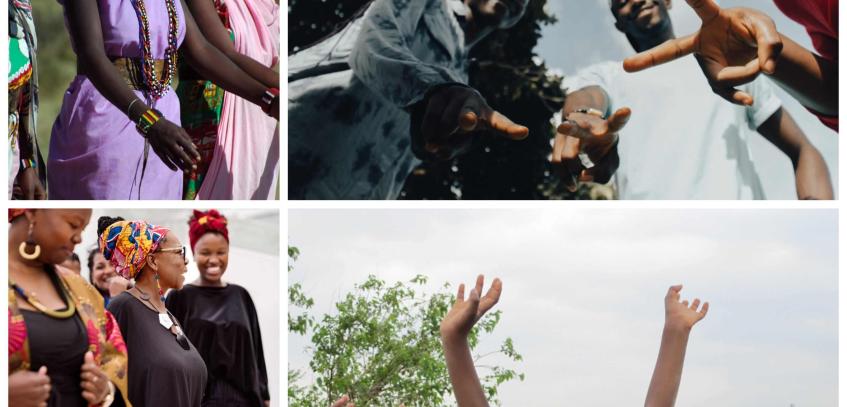What: CSOs Dialogue on Cross-Cutting Issues Concerning Women, Youth, Peace and Security, and Child Protection in Conflict Situations
Who: The African Union Economic Social and Cultural Council (ECOSOCC), The European Union (EU) and The Common Market for Eastern and Southern Africa (COMESA)
When: 1 November 2022 at 9AM (CAT) Where: Taj Pamodzi Hotel, Lusaka, Zambia/Virtual via Zoom
Objectives:
- The overall objective of the forum is to provide a platform for dialogue between CSOs and key experts on cross-cutting issues relating to peace and security in Africa. Other objectives for the CSO dialogue includes:
- To popularise the African Peace and Security Architecture;
- To provide a forum for information exchange, as well as to analyse, highlight, frequently overlooked and understudied cross-cutting issues affecting Africa's peace and security;
- To use civil society organisations as champions for mainstreaming key cross-cutting themes such as women, youth, the environment, and climate change in peace and security frameworks at the continental and regional levels; and
- To create an outcome document that includes positive key messages and recommendations on how to approach and incorporate cross-cutting issues into the AU's peace and security agenda, as well as to inform peace and security.education on the continent.
Background:
Conflict and violence are issues that transcend borders. Beyond the stereotypical conflict drivers, there is a need to delve into the often overlooked issues, such as how the impact of violence and conflict is disproportionately felt by vulnerable groups. Furthermore, when viewing peace and security through a spatial lens, certain contributing factors such as the environment, disasters, and climate change frequently go understudied. As a result, addressing these intersecting issues is one of the approaches needed to advance peace and security in Africa, and it can only be done by identifying the necessary stakeholders and raising their awareness of how these issues interrelate and how they can be mitigated.
Significantly, this can be accomplished by strengthening capacities and bolstering existing partnerships, as well as forging new alliances with civil society-led grassroot organisations that represent those negatively impacted by conflict. More importantly, rather than viewing vulnerable groups as victims of conflict, more dialogue is required to unearth the more complex roles of vulnerable groups in conflict situations, as well as how they can help accelerate the African Union's ambitions for peace and stability on the continent, particularly in the peacebuilding and reconstruction process.
In this regard, the Secretariat of the African Union Economic, Social, and Cultural Council (AU-ECOSOCC) has helped to highlight the critical need for African civil society organisations (CSOs) to be more involved in various thematic issues, particularly peace and security. ECOSOCC, as a civil society policy organ, has thus played an important role in facilitating CSO participation in efforts to promote peace and stability in Africa, allowing African civil society organisations to leverage the provided platform to lead impactful initiatives within their communities to supplement national, regional, and continental endeavours.
Moreso, ECOSOCC's initiative to strengthen CSO capacity in this thematic area is guided by Article 8, sub-articles 10, 11, and 20 of the Peace and Security Council (PSC) Protocol, as well as the Livingstone Formula and the Maseru Conclusions, all of which are important components of AU Agenda 2063's Aspiration 4, which envisions a peaceful and fully functional and operational APSA. The Livingstone Formula and Maseru frameworks, in particular, emphasise the importance of strengthening CSOs' ability to contribute to peace, security, and stability through conflict prevention, management, and resolution, peacemaking and mediation, peacekeeping, and post-conflict reconstruction and development. This is especially important given the failure of initiatives led by the AU, Regional Economic Communities (RECs), and Regional Mechanisms (RMs) to effectively engage civil society in peace and security, particularly in encouraging CSOs to actively participate in the operationalization of the African Peace and Security Architecture (APSA).
Recognizing the efforts made but also the widening gap, the fourth European Support Programme to the African Peace and Security Architecture (EU APSA IV), which includes civil society engagement as one of its primary objectives, has provided an opportunity to further strengthen CSO capacity and participation in the area of peace and security. Through this, ECOSOCC and COMESA have collaborated on a project titled "Enhancing the Participation of African Civil Society in the African Peace and Security Architecture," with the goal of ensuring the implementation of the PSC Protocol, the Livingstone Formula, and the Maseru Conclusions, as well as increasing CSO involvement and participation in African Union peace and security activities.
In this regard, the joint ECOSOCC-COMESA 2022 project implementation proposals were officially endorsed on February 26, 2022, during the 4th Steering Committee of the EU-APSA IV project. Following that, ECOSOCC will launch one of the EU-APSA IV project activities by hosting a forum for CSO dialogue, knowledge sharing, and capacity building with experts on peace, security, and stability, with a focus on cross-cutting issues such as gender, youth, and the protection of children, indigenous, migrants, refugees, asylum seekers, and other vulnerable groups in conflict situations.
The forum will convene African civil society organisations active in the field of peace, security as the primary participant group. In addition, technical officers and specialists in the thematic area, African Union, AUC PAPS and ECOSOCC’s GA Members, will participate in the dialogue.
The media are invited to cover the meeting on 1 November 2022 at 9AM (CAT), Taj Pamodzi Hotel in Lusaka, Zambia and via Zoom: https://zoom.us/webinar/register/WN_jLeEbq1TRAqfOMt5fAQYog





